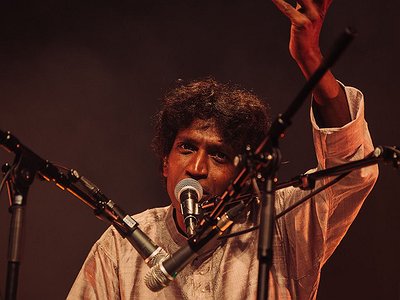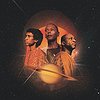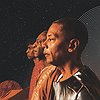Name: Prabhu Edouard
Nationality: French-Indian
Occupation: Tabla player, composer, improviser, performer
Current release: Prabhu Edouard teams up with Jeff Mills and Jean-Phi Dary as Tomorrow Comes The Harvest for the album Evolution, out via Axis. US customers can order directly from the Axis online store. International orders via Big Wax. Digital download on Apple Music.
The trio will perform selected concerts to present the music live:
12 SEP - Rome - Auditorium Parco della Musica (Romaeuropa Festival). For tickets, go here.
16 SEP - Cologne- Philharmonie. For tickets, go here.
17 SEP - Berlin -Theater des Westens (Tingel Tangel Festival). For tickets, go here.
23 SEP - National Concert Hall (with Rasheeda Ali) - Dublin, Ireland. For tickets, go here.
24 SEP - Royal Theater of Mons - Mons, Belgium. For tickets, go here.
Recommendations: “Defacement” by Jean-Michel Basquiat. He painted it in 1983. But since then, only numbers have increased in the calendar, while freedom and tolerance still stagnate to bottom.
This very week is our album release time, I strongly recommend your honourable readers to check out Evolution featuring Jeff Mills, Jean-Phi Dary and yours truly!
[Read our Jeff Mills Interview]
[Read our Jeff Mills interview about Metropolis]
[Read our Jean-Phi Dary interview]
If you enjoyed this Prabhu Edouard interview and would like to stay up to date with his music, visit his official homepage. He is also on Instagram, Facebook, and Soundcloud.
For more information on the tabla:
[Read our Avadhut Kasinadhuni interview]
[Read our Matthew Aidekman of TablaTun interview]
When I listen to music, I see shapes, objects and colours. What happens in your body when you're listening? Do you listen with your eyes open or closed?
As a tabla player, I sit cross-legged on a carpet in front of my instrument. I often experience a paradoxical situation of having to respond in a static body position to musical forms, whether they are calm and moving or intense and exciting.
This has compelled me to feel the intensity of my perception in a more introvert way. But sometimes when joy takes over, my upper body can’t help but take part to the flow of groove.
About the eyes, they naturally close when my listening goes deeper. I like to have them open when I need to see people’s face, eyes, vibes to connect with the ambient energy that artist and audience co-create. While traveling, landscape is another ‘eye-opener’ and mood maker …
What were your very first steps in music like and how would you rate the gains made through experience - can one train/learn being an artist?
My parents were music lovers, they loved to put up parties at home that would turn into Bollywood & Kollywood (South-Indian movies) songs jam session.
It all would start after food, when my uncle would take out that pair of drum that fascinated me. From that raw energy of drumming for sharing exhilaration, I later went to Indian classical music where I learned to explore more abstract concepts in drumming that lead to deeper experiences with rhythm and groove.
My mentor maestro Shankar Ghosh used to say, I can make you a tabla player, your environment will make you the musician you’ll become … and about the artist you’ll be - that’s god’s job!
According to scientific studies, we make our deepest and most incisive musical experiences between the ages of 13-16. What did music mean to you at that age and what’s changed since then?
The first time my fingers touched a Tabla, I was 13: Quod Erat Demonstrandum!
That moment has shaped my entire life. Before that, there was school, play grounds with the neighbours' children, kids TV shows … And all of a sudden there was Tabla and the rest.
The etymology of religion is “relegere” or “religare” which in latin means to relate or bring together. Since then, music has somewhat become my religion …
Tomorrow Comes the Harvest Interview Image by Jacob Khrist Maude Muller
What, would you say, are the key ideas behind your approach to music and what motivates you to create?
My tool of expression comes from the Indian musical idiom. So that’s the window from where I look at the Music universe in its incredible diversity. I don’t want that window to only show the Taj Mahal or the Himalayan peaks. I want to view unseen landscapes, be they real or imaginary. Poetry has that power.
Likewise, I want music to transcend the technical content we manipulate. The fact that it’s challenging for my fingers is my business, it rather should challenge my and the listener's mind to go broader.
Anything that inspires to do that is food and fuel for my music
To quote a question by the great Bruce Duffie: When you come up with a musical idea, have you created the idea or have you discovered the idea?
I definitely prefer the word “discover” but then who or what unveiled that “cover” to highlight that underlying beauty to you?
Spirits are humble, discrete and generous when you can hear their gentle whisper …
Paul Simon said “the way that I listen to my own records is not for the chords or the lyrics - my first impression is of the overall sound.” What's your own take on that and how would you define your personal sound?
Tabla, as you probably know, is a language where recitation of syllables is a sophisticated practice close to prose. Narration is an essential aspect of that art.
Beyond time signature, beat division and repertoire my sound has to speak and grasp your attention for the fable I want to convey!
Those words have no meaning, each listener will hear a different story. It doesn’t matter as long as they heard a moving one.
Sound, song, and rhythm are all around us, from animal noises to the waves of the ocean. What, if any, are some of the most moving experiences you've had with these non-human-made sounds? In how far would you describe them as “musical”?
2 weeks ago I was in the South-East of France in an awesome hilly area called “Les Cévennes”. In a spot where we had a tent, no cars, no houses no human presence except ours. At night there was that immensity of a cloudless and dark sky, myriad of stars and silence. That silence is so sonorous. A matrix of all sounds to emerge.
Music is not just about organizing audible sound, it’s about feeling vibrations down to the most subtle level of perception. Henceforth, nature is an endless ground for musical genesis.
From very deep/high/loud/quiet sounds to very long/short/simple/complex compositions - are there extremes in music you feel drawn to and what response do they elicit?
Ati Vilambit means extremely slow tempo in a long Indian rhythmic cycle. It’s mainly used in vocal music in North India. There is a point where the drummer stops dividing the beat. He breathes with the beat so to speak. Each pulse becomes a tangible entity.
It’s a nice contrast with the fast and exacerbated rhythms in modern musical forms that we usually are exposed to. By giving your presence to time, time becomes a present.
Tomorrow Comes the Harvest Interview Image by Jacob Khrist Maude Muller
Could you describe your creative process on the basis of one of your pieces, live performances or albums that's particularly dear to you, please?
Improvisation is an essential part of my musical journey. In other word spontaneous creativity.
My recent collaboration with Jeff Mills and Jean-Phi Dary is very much related to that aspect, for it’s a confluence of 3 musical personalities, styles which results in an instrumental combo that is one of a kind. No common musical ground to cling on to and yet a strong urge to meet beyond the known!
Our album Evolution embodies that desire to let happen rather than make happen. Mankind’s desirable evolution is perhaps the process of learning to listen to our inner self and let something wiser and greater than us leads the way towards the non beaten path
Do you conduct “experiments” or make use of scientific insights when you're making music?
Depends on what you call science. To me, science as a tool to apprehend the physical world we live in encompasses a larger meaning than technology or academic science. Yoga, in its deepest form is science too.
Mathematics on the other hand can be a poetic subject too, it’s even one of the characteristics of the Indian rhythmic repertoire. 7 as a number of beats takes a whole different meaning when you know that it unites chakras, musical scales, seas, every week you live. .. It gives a symbolic and holistic substance to your musical content.
How does the way you make music reflect the way you live your life? Can we learn lessons about life by understanding music on a deeper level?
A great Indian percussionist once said the best accompanist is the one who knows when not to play.
Music is first about listening and then playing if required. Understanding that is essential in music-making. Painters, sculptors and writers I think have a better understanding about that attitude than us musicians, especially performing ones, for we are seldom alone.
In India, music is considered as a “Sadhana” a spiritual practice that can lead to the liberation of souls. A chance for an instant of epiphany to happen and set your soul in search of that state of oneness despite the multitude that surrounds you.
Do you feel as though writing or performing a piece of music is inherently different from something like making a great cup of coffee? What do you express through music that you couldn't or wouldn't in more 'mundane' tasks?
It would be pretentious to think that creativity is confined to artistic skills. We say Chef for a music conductor as well as a great cook.
My youngest brother is a mixologist barman, he can spend hours counting the right number of drops of a liquor while searching for an unusual taste or recipe for a cocktail! I find myself doing the same with sounds.
The goal is to express yourself with care and honesty. That drink in the glass like that stage in the theatre will soon be empty. But something immaterial will remain. In India they call it Rasa, it means essence.
Every time I listen to "Albedo 0.39" by Vangelis, I choke up. But the lyrics are made up of nothing but numbers and values. Do you, too, have a song or piece of music that affects you in a way that you can't explain?
Italian composer Riccardo Nova's latest orchestral work on a piece called "Mahabharata" featuring Indian musicians, Western classical musicians and electronic components.
I have heard many musical pieces by Indian composers illustrating the Mahabharata grand Epic. Surprisingly Nova's musical rendering of those lyrics in Sanskrit from a culture that he is an outsider of, to my taste, is the most moving one I’ve heard so far.
If you could make a wish for the future – what are developments in music you would like to see and hear?
Mama Africa and mother India have so much to share in music.
A lot has already happened between East and West, it’s about time more happens with South and South. There are many more bridges yet to build between both lands of groove and spirituality.






